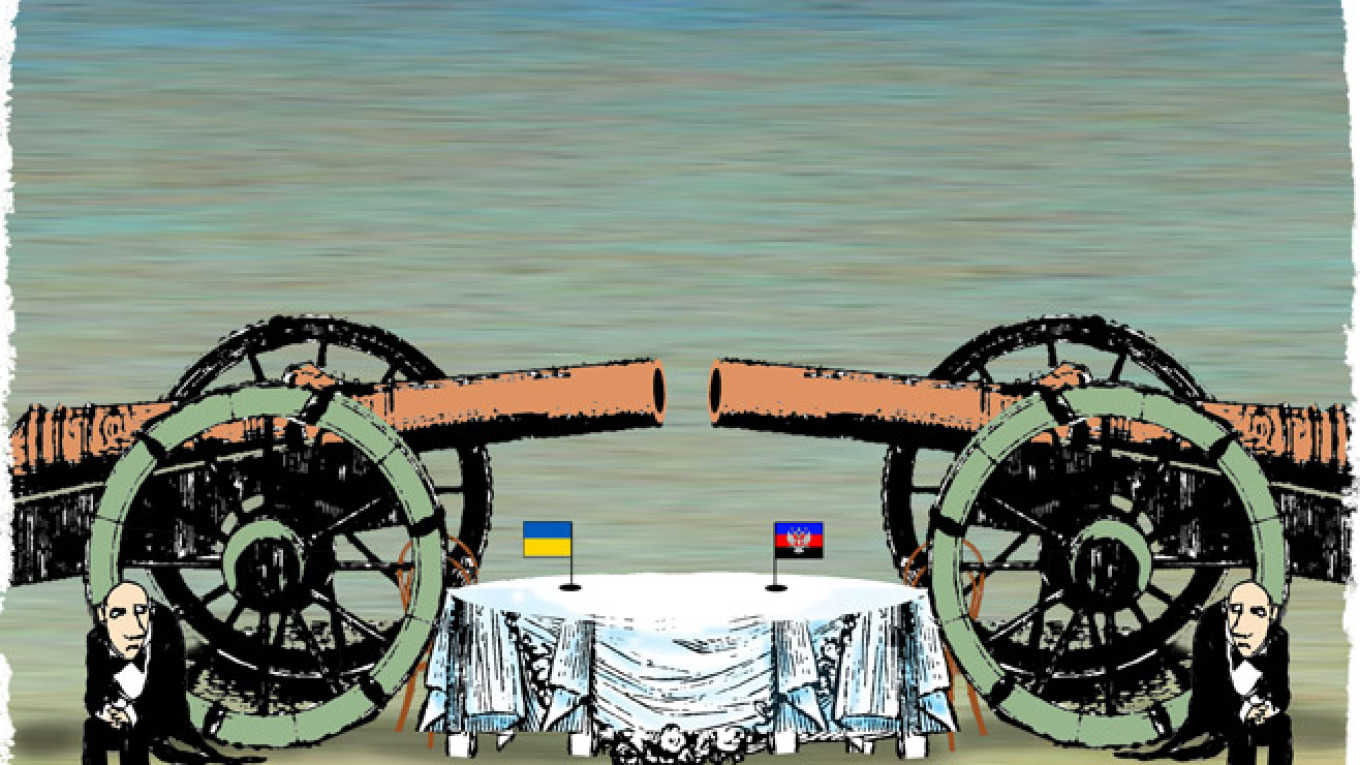The time has come to admit that diplomacy is not all-powerful, and that endless calls for peace, in the absence of real conditions for peace, eventually devolve into demagoguery. Such calls are outwardly very humane, but inwardly devoid of content. Of course, even a "bad peace" is better than a "good war," but even a "bad peace" is not always attainable.
In this way, the current escalation of the conflict in eastern Ukraine was inevitable. Implementing the provisions of the Minsk Protocol is impossible if the conflicting parties are unwilling to take even the first step in the process — observing a cease-fire.
The West routinely blames the pro-Russian separatists for renewing hostilities, while Russia blames the government in Kiev, even though, of course, both sides are guilty.
Moreover, it is futile to hold either Russian President Vladimir Putin or Ukrainian President Petro Poroshenko personally responsible for the acts of violence. First, this is a civil war, the most brutal of all contests and the type in which passions always flare beyond the bounds of the rules and customs of war as recognized by international law.
Second, detachments of soldiers are fighting on both sides that only nominally obey their respective leaders. Both volunteers and mercenaries are fighting alongside the separatists in eastern Ukraine, and why would a mercenary observe a truce?
Poroshenko can promise whatever he wants, but he does not control the "private" army financed by the oligarchs, nor the units of the Right Sector and other radicals.
As a result, even if Poroshenko manages to silence the guns of the Ukrainian army regulars, there is no guarantee whatsoever that the irregulars of every stripe will stop shelling the civilian neighborhoods of Donetsk.
It is also a mistake to exaggerate Putin's ability to influence the situation. Yes, he holds considerable authority in eastern Ukraine, but not unlimited authority. To believe otherwise is only an illusion. There are many guerrilla fighters among the separatists.
It is well-known that many of the field commanders rebuke Putin for having stopped their previous offensive when the momentum was in their favor. Now, they say, they will not give Kiev a second respite, no matter what Moscow demands.
And finally, it was inevitable that the Minsk Protocol would reach an impasse because neither side is as yet inclined to make the slightest compromise. Kiev is determined to regain lost territory even while the separatists are struggling to expand their zone of control.
Kiev rejects federation and only mumbles something about a certain decentralization of power while the separatists demand self-determination and independence. And so on.
Kiev still refuses to recognize the separatist militias as full-fledged participants in negotiations. Where is the basis for compromise under such conditions?
Such deadlocks are common in history, but unfortunately, it was usually not the diplomats who found a way out of the labyrinth but the generals who, without thinking twice, punched a hole in the wall with their tanks. Only after that did the diplomats step in.
An interesting example from history is the Balkan wars of the 19th century. Bosnia and Herzegovina were in turmoil and the Russian world was indignant over the behavior of the Turks and the indifference of the British to the increasingly violent situation.
So when the Russian ambassador asked British diplomat Lord Derby to finally explain the meaning of British policy in the east, the latter coolly remarked that the Christian insurgents? in Bosnia and Herzegovina were not fighting for the sake of administrative reforms, but for independence or autonomy from the Muslim Ottoman Empire, which would not be willingly granted.
Thus, the two sides held mutually exclusive positions, leaving no room for agreement. Lord Derby concluded by saying that the great powers could do nothing but wait for the outcome of the struggle.
If the Turks failed to subdue the uprising, then perhaps the Sultan would agree to recognize Bosnia and Herzegovina as autonomous regions. But if, on the other hand, the Turks defeated them in battle, the rebels would show greater compliance.
At the current stage of the conflict in eastern Ukraine, the diplomats will have to temporarily step aside. They will continue with their work in one form or another and, God willing, achieve some progress, but they will not set the agenda for the contending parties.
The time to fight has come again to eastern Ukraine, and a great deal of blood will continue to spill there because neither the separatists nor the Ukrainian army can achieve a decisive victory yet. Thus, the fever of war — with its brief remissions and its sudden seizures — will long continue. It is deeply regrettable, but a fact.
Pyotr Romanov is a journalist and historian.
A Message from The Moscow Times:
Dear readers,
We are facing unprecedented challenges. Russia's Prosecutor General's Office has designated The Moscow Times as an "undesirable" organization, criminalizing our work and putting our staff at risk of prosecution. This follows our earlier unjust labeling as a "foreign agent."
These actions are direct attempts to silence independent journalism in Russia. The authorities claim our work "discredits the decisions of the Russian leadership." We see things differently: we strive to provide accurate, unbiased reporting on Russia.
We, the journalists of The Moscow Times, refuse to be silenced. But to continue our work, we need your help.
Your support, no matter how small, makes a world of difference. If you can, please support us monthly starting from just $2. It's quick to set up, and every contribution makes a significant impact.
By supporting The Moscow Times, you're defending open, independent journalism in the face of repression. Thank you for standing with us.
Remind me later.


